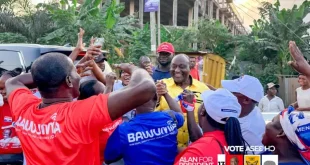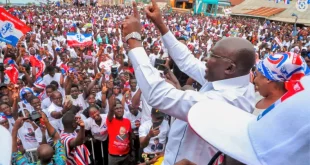Dr. George Akufo Dampare, the Inspector General of Police, has urged his staff to remain unfazed by the various anti-corruption studies that rate the organization as the most corrupt in the nation.
The Police IGP made this point quite obvious when he spoke at a public lecture on the subject of social science at Kwame Nkrumah University of Science and Technology “the changing phases of policing in Ghana; the expectations and role of the university community.”
“We have never said that there are not a couple of people who are doing things in a corrupt way tarnishing the image of the service. We are doing all that we can to handle it but we will never accept the tag that we are the most corrupt institution in the country,” he averred.
He expressed his extreme objection just a day after the GRA Commissioner for Customs, Colonel Kwadwo Damoah (Rtd), retaliated against organizations who continue to include his employees among the most corrupt organizations, claiming that such polls are unreliable.
Dr. George Akufo Dampare acknowledged a significant discrepancy between public expectations and the performance of the Ghana Police Service by citing a number of academic results.
The police commander, however, disputed the methodology behind a number of Afrobarometer studies, Corruption Perception Indices, and the most recent jointly conducted Ghana Integrity of Public Services Survey results that all showed the police holding the top spot.
“It is unfounded because all those researches have challenged methodologies and at the appropriate time we shall keep responding to them. We will also keep working at the things that people, over the years, have been using against us and made us so uncomfortable when it comes to the issue of corruption,” he guaranteed.
The IGP proposed several strategic policy axes that ought to promote public safety and confidence in the police force.
He promised that the three-pronged approach would result in a professionally motivated police force that displayed accountability and professionalism within a solid and well-organized chain of command.
When it comes to institutions tasked with the obligation to maintain the security of the state, the public was advised not to take a neutral stance by the lecture’s moderator and vice chancellor of KNUST, Prof. Akosua Dickson.
She emphasized that effective policing is a shared obligation and a factor in the survival of the democracy on which the nation is based.
Additionally, the lecture gave the police and the university the chance to strengthen their partnerships for knowledge transfer in fields of technical and professional expertise.
Source: Ghanatodayonline.com
 Ghanatodayonline.com News, Politics, Health, Education & More
Ghanatodayonline.com News, Politics, Health, Education & More



